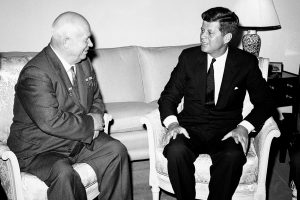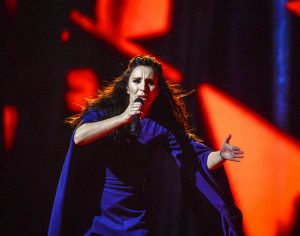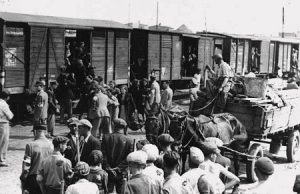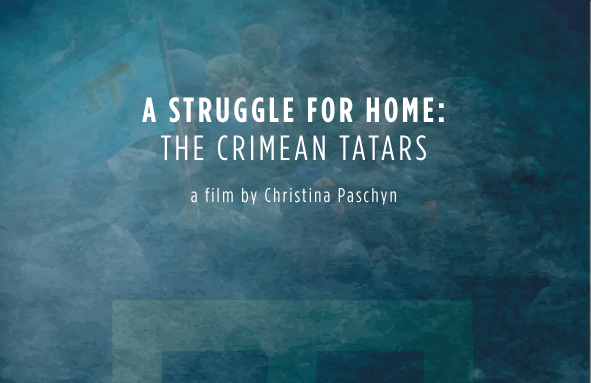The Russian media which had predicted the victory of the Russian competitor in this year’s Eurovision song competition, something that would have given Moscow a boost and the right to host next year’s competition, have fallen to the level of an old Soviet anecdote now that Crimean Tatar Jamala has won for her people and Ukraine.

In Soviet times, the story was widely told that when Nikita Khrushchev met with John F. Kennedy at Vienna for a summit, the two decided on a footrace. Not surprisingly, the young American president defeated the older and significantly more out of shape Soviet premier, putting the Moscow media in a difficult position.
Moscow newspapers and television could hardly report the facts of the case because that would boost the Americans and represent a slap in the face to Khrushchev. As a result, they came up with a strategy that characterized much Soviet reporting about things – and one that has now reemerged in the age of Vladimir Putin.
After the Khrushchev-Kennedy race, Moscow media said, the Soviet premier “thanks to his heroic efforts” finished “second from first,” while the American president who represented the rotting capitalist West and despite his very best efforts was only able to finish “second from last.”
The report in “Vesti” this weekend is unfortunately not atypical of Russian coverage of Jamala’s victory but all too typical of the kind of Soviet-style reporting that the old anecdote made fun of.
The Russian outlet begins by saying that “viewers gave the victory to Russia, but first place was nonetheless left to Ukraine,” the result of “new voting rules” in the Eurovision competition which “permitted the organizers to correct the results according to their own discretion,” an implicit suggestion that Russia was robbed.
 “Vesti” continued with the observation that “Internet users are actively commenting about this, and many of them aren’t hiding their disappointment” that the Russian singer didn’t win and “calling the results of Eurovision obviously politicized” and directed against Russia and for Ukraine.
“Vesti” continued with the observation that “Internet users are actively commenting about this, and many of them aren’t hiding their disappointment” that the Russian singer didn’t win and “calling the results of Eurovision obviously politicized” and directed against Russia and for Ukraine.
Jamala, who sang about the deportation of the Crimean Tatars in 1944, an event other Russian outlets said was not a punishment but a search for a better life (!), won, “Vesti” said, but only “thanks to the vote by a professional jury.” If the people had been listened to, the Russian would have won.
Now, “Vesti” notes, next year’s Eurovision will take place in Ukraine because that is the country from which this year’s winner came. But the Russian outlet was not prepared to leave it at that. It reported that someone at Jamala’s press conference wanted to know if she would like to have Eurovision “in liberated Crimea,” a formulation only a pro-Moscow speaker would use.

She responded that she “hopes that Eurovision will be in Ukraine,” although she acknowledged that she “doesn’t know where precisely.”
Then, “Vesti” reported, in a transparent effort to politicize Eurovision still further, that in attendance when Jamala sang her song about the deportation was Mustafa Dzhemilev, himself a victim of the deportation but whom “Vesti” described as “the leader of the unrecognized mejlis who is being sought on a Russian warrant and who supported the energy blockade of Crimea.”
And the Moscow outlet concluded: “After the declaration of the Eurovision results, questions inevitably are arising: how can a country which has a hole in its budget, a war in its east, and regular disorders in its capital conduct such a competition?”
Those are useful questions but only if they are addressed to Moscow which has a budget shortfall, has launched a war, and regularly features ethnic clashes not only in the capital but elsewhere around the country.
Related:
- 'Jamala glorified Ukraine and Crimea!" -- Crimeans on Jamala's Eurovision win
- Crimea comes to Eurovision
- Ukraine's Parliament asks BBC to stop using "civil war" for Russia's aggression
- Life in annexed Crimea: Protesting Russia's brutal occupation
- Crimean Tatars find new home in traditional Lviv
- 8 shades of Jamala, Ukraine's Eurovision contestant
- Kremlin disinformation and Ukraine: The language of propaganda
- I am Crimean Tatar, Crimea is Ukraine!
- Crimea: Yeltsin's lucidity and Putin's blindness





